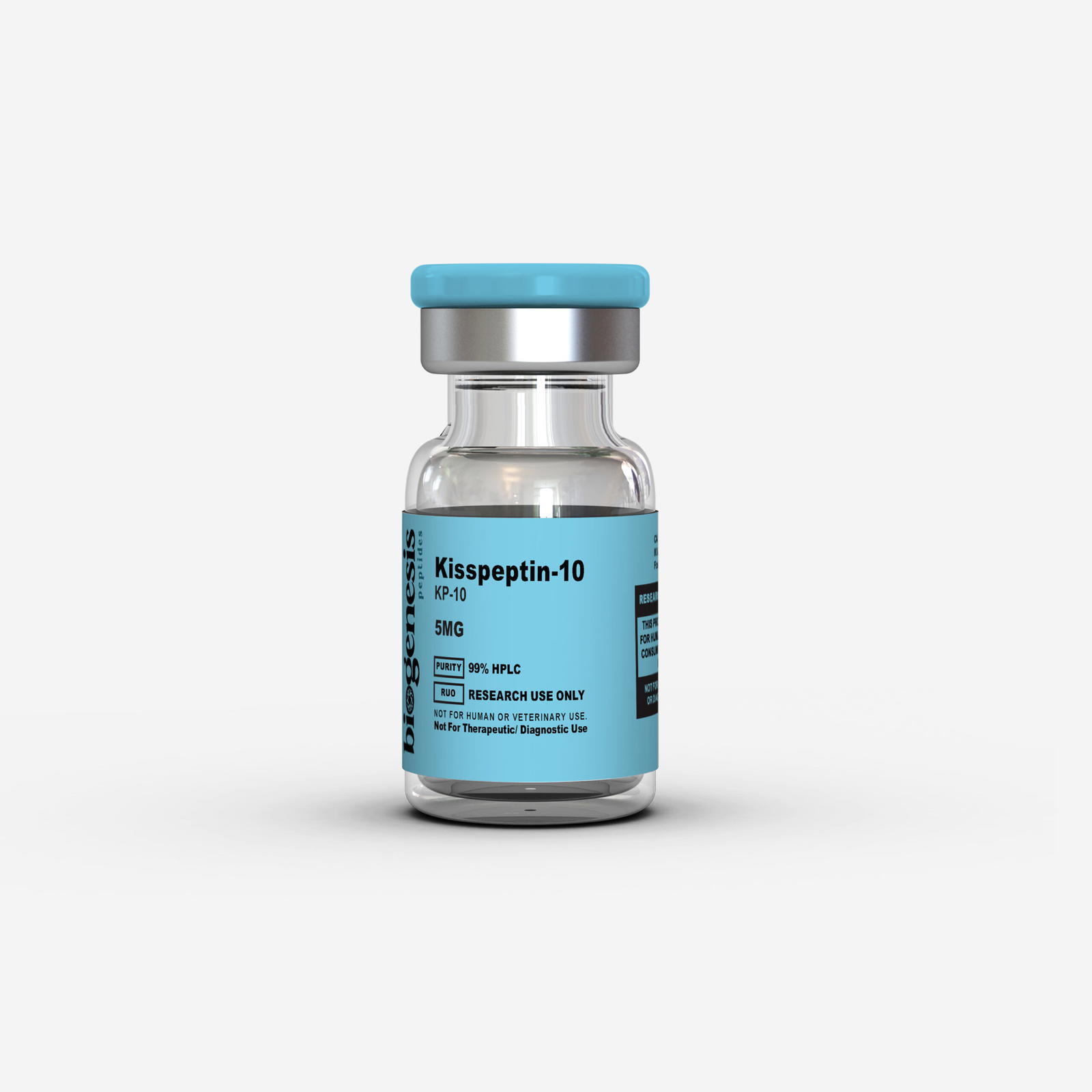Product Usage
THIS PRODUCT IS INTENDED AS A RESEARCH CHEMICAL ONLY. This designation allows the use of research chemicals strictly for in vitro testing and laboratory experimentation only. All product information available on this website is for educational purposes only. Bodily introduction of any kind into humans or animals is strictly forbidden by law. This product should only be handled by licensed, qualified professionals. This product is not a drug, food, or cosmetic and may not be misbranded, misused, or mislabeled as a drug, food, or cosmetic.
Kisspeptin-10 10mg
Kisspeptin-10 (KP-10) is a naturally occurring peptide that plays a critical role in reproductive hormone regulation. It serves as the primary trigger for the release of gonadotropin-releasing hormone (GnRH), which regulates key reproductive hormones such as testosterone, estrogen, and luteinizing hormone (LH).
$99.00
Peptides will arrive in a lyophilized (powder) form for maximum stability
Buy 5 for 5% off
Buy 10 for 10% off
Buy 15 for 15% off
OVERVIEW
Kisspeptin-10 (KP-10) is a naturally occurring peptide that plays a critical role in reproductive hormone regulation. It serves as the primary trigger for the release of gonadotropin-releasing hormone (GnRH), which regulates key reproductive hormones such as testosterone, estrogen, and luteinizing hormone (LH).
Beyond its well-established role in reproductive function, emerging research suggests Kisspeptin-10 may also contribute to:
- Enhancing fertility and reproductive health
- Increasing testosterone levels in males
- Regulating mood, motivation, and behavior
- Modulating energy balance and metabolism
- Suppressing tumor growth and cancer metastasis
These potential benefits make KP-10 a promising candidate for therapeutic applications in reproductive medicine, endocrinology, neurology, and oncology.
RESEARCH
Reproductive Hormone Regulation
- Kisspeptin-10 initiates the release of GnRH, which stimulates LH and FSH secretion from the pituitary gland.
- This regulatory function makes it essential for puberty onset, fertility, and overall reproductive function.
- Potential application: Treatment of delayed puberty, hypogonadism, and infertility.
Testosterone Enhancement
- Clinical studies show that KP-10 significantly increases testosterone levels in men within 90 minutes of administration.
- This occurs by modulating LH pulse frequency, which fine-tunes the natural release of sex hormones.
- Potential application: Hormonal therapy and fertility enhancement in males.
Mood, Motivation, and Libido
- Research links Kisspeptin to brain regions involved in reward-seeking behavior, motivation, and emotional regulation.
- A clinical study on 29 men found that KP-10 administration enhanced limbic brain activity, suggesting benefits in treating low libido and mood disorders.
- Potential application: Treatment for hypoactive sexual desire disorder (HSDD) and mood-related conditions.
Energy Balance and Metabolism
- Kisspeptin neurons are highly sensitive to nutritional status, influencing GnRH release based on energy availability.
- Studies in genetically modified mice lacking Kiss1 receptors showed weight gain and reduced energy expenditure, indicating a role in obesity regulation.
- Potential application: Obesity management and metabolic health support.
Anti-Cancer Research
- Kisspeptin-10 has been linked to tumor suppression by reducing metastatic spread in various cancers.
- A groundbreaking study found that KP-10 suppressed melanoma metastasis by 95%.
- Altered kisspeptin levels have also been observed in breast, prostate, bladder, ovarian, and thyroid cancers, suggesting a role in tumor migration suppression.
- Potential application: Development of kisspeptin-based cancer therapies.
Memory and Cognitive Function
- Research suggests Kisspeptin analogs may enhance memory retention and cognitive flexibility.
- Studies in mice indicate that KP-10 counteracts learning impairments associated with alcohol exposure.
- Potential application: Neurological research and cognitive function support.
Kidney and Cardiovascular Health
- Kisspeptin receptors have been identified in the kidneys, where they support glomerular development and function.
- KP-10 has been linked to blood vessel function and cardiac output regulation, making it a potential therapeutic target for cardiovascular diseases.
- Potential application: Cardiovascular health and kidney disease treatment.
STRUCTURE
- Amino Acid Sequence: YNWNSFGLRF
- Molecular Formula: C₆₃H₈₃N₁₇O₁₄
- Molecular Weight: 1302.4 g/mol
- CAS Registry Number: 388138-21-4
- Synonyms: KISS-1, Protein KISS-1, Metastin, KP-10 Peptide
CITATIONS
- W. S. Dhillo et al. Kisspeptin-54 stimulates the hypothalamic-pituitary-gonadal axis in human males. J. Clin. Endocrinol. Metab. (2005).
- J. T. George et al. Kisspeptin-10 is a potent stimulator of LH and increases pulse frequency in men. J. Clin. Endocrinol. Metab. (2011).
- C. J. L. Harter, G. S. Kavanagh, and J. T. Smith. The role of kisspeptin neurons in reproduction and metabolism. J. Endocrinol. (2018).
- E. J. Mead et al. Kisspeptins: a multifunctional peptide system with a role in reproduction, cancer, and the cardiovascular system. Br. J. Pharmacol. (2007).
- T. Ly, S. Harihar, and D. R. Welch. KISS1 in metastatic cancer research and treatment: potential and paradoxes. Cancer Metastasis Rev. (2020).
- P. Pazarci et al. The effects of daylight exposure on melatonin levels, Kiss1 expression, and melanoma formation in mice. Croat. Med. J. (2020).
- E. Gibula-Tarlowska and J. H. Kotlinska. Kissorphin improves spatial memory and cognitive flexibility impairment induced by ethanol treatment in the Barnes maze task in rats. Behav. Pharmacol. (2020).
- A. N. Comninos et al. Kisspeptin modulates sexual and emotional brain processing in humans. J. Clin. Invest. (2017).
- M. Bhattacharya and A. V. Babwah. Kisspeptin: Beyond the Brain. Endocrinology (2015).
- Antitumor efficacy of Kisspeptin in human malignant mesothelioma cells. PubMed Central (PMC).
All products on this site are for Research, Development use only. Products are Not for Human consumption of any kind.
The statements made within this website have not been evaluated by the US Food and Drug Administration. The statements and the products of this company are not intended to diagnose, treat, cure or prevent any disease.
Biogenesis Peptides is a chemical supplier. Biogenesis Peptides is not a compounding pharmacy or chemical compounding facility as defined under 503A of the Federal Food, Drug, and Cosmetic act. Biogenesis Peptides is not an outsourcing facility as defined under 503B of the Federal Food, Drug, and Cosmetic act.

